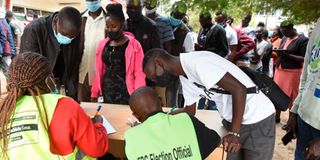Multi-sectoral team critical to credible polls

Members of the public queue to register as voters using a biometric kit, during the Continuous Voters Registration by the Independent Electoral and Boundaries Commission at Eldoret Huduma Kenya precincts in Uasin Gishu County on November 01, 2021.
What you need to know:
- Ensuring violence-free and credible polls is a primary duty of the Independent Electoral and Boundaries Commission.
- A working relationship between the IEBC, the Judiciary, police and political parties is, therefore, a necessary symbiosis.
The significance of security as a critical factor in the electoral process will undoubtedly rise as the next general election approaches.
Activities such as the recently concluded voter registration and the political rallies going on the country ride on assured security. The expectation that a political event will be free from personal harm and other risks is a factor in deciding whether to attend or not.
The onus of enforcing and guaranteeing security is vested with the government and its agents. It is essential to continuously appraise the security situation to guide strategies and interventions.
Acquisition and deployment of relevant personnel and equipment are also factors. Diligence demands that lessons from past challenges to peace and order and their consequences be learnt.
Our poll history has painful lessons. Innocent Kenyans have suffered forced displacement and internecine ethnicised clashes often disguised as feuds over land and other resources. Equally recurrent is the weaponisation of cattle rustling and other cultural practices to advance political agenda around the electoral season. Inevitably, this leads to deaths and destruction of property.
Election-linked violence
Failure to anticipate and plan for containment measures for election-linked violence would be irresponsible of the government. Isolated cases of intolerance and exclusionist zoning of perceived political fiefdoms underscore the need for early detection of whatever threatens credible polls. Conflict-mongers must not be allowed to thrive.
Ensuring violence-free and credible polls is a primary duty of the Independent Electoral and Boundaries Commission (IEBC). This is, however, reliant on the support given to the IEBC by the Treasury, the Interior ministry, the police, Judiciary and political parties.
The IEBC needs funding, security services and the Judiciary to give bite to sanctions against election-related offences. It needs politicians and political parties to subscribe to and adhere to the code of conduct.
A working relationship between the IEBC, the Judiciary, police and political parties is, therefore, a necessary symbiosis. This relationship must be deliberate, planned for and nurtured.
The multi-sectoral team on elections preparedness convened by the Chief Justice should, therefore, be seen in this context. Its membership captures the core of the critical election stakeholders. Its objectives, which include assessing the level of preparedness for involved institutions against the risks and threats related to the elections, is appropriately pertinent.
Security-related risks and threats
A collegial approach is also an effective way of enhancing performance through peer supervision. By critically assessing each other’s plans and strategies against resources and needs, the players within the National Multi-Sectoral Consultative, as the team is officially known, will be able to finetune the bigger election framework.
Specifically, they will be better able to map security-related risks and threats. The needs-vs-gaps of the technological framework required to deliver elections will be analysed closely. The legal reforms around the election ecosystem, their rationale and the timelines for the same will be put under a microscope. The ideal-vs-existing capacities of the Judiciary will be appreciated. The team will also develop a framework for engaging the public on poll preparedness.
This important assignment calls for leadership. Chief Justice Martha Koome has rightfully taken charge of the team. The AG, relevant Cabinet secretaries, the Inspector General of Police and the IEBC chairman all attended the inaugural meeting in person, underscoring its importance.
Exigencies of duty may make it difficult for the members to continue in-person attendance, but the assignment will demand the close attention and supervision of respective institutional heads.
Their engagement with IEBC and election preparedness should be seen in this light.
The writer is the Director of Communication, Ministry of Interior and Coordination of National Government





